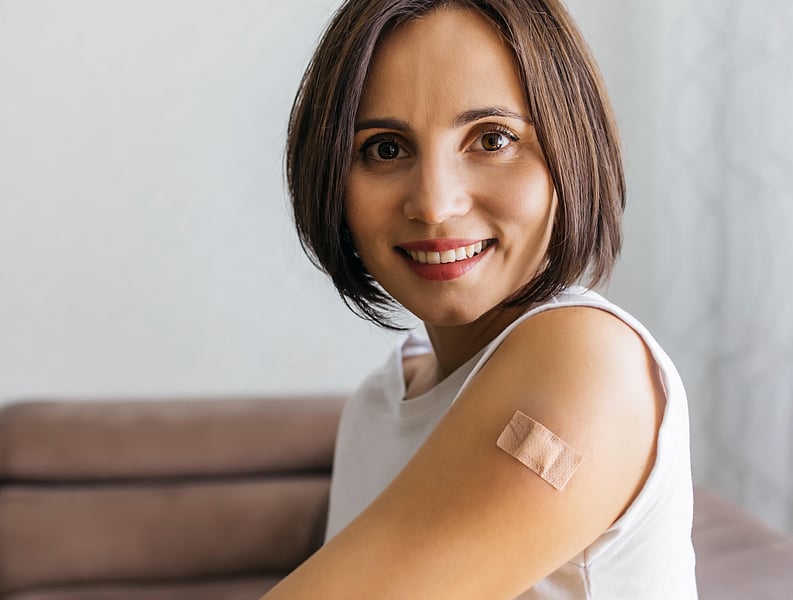Manténgase sano!

- Amy Norton
- Posted January 7, 2022
COVID Vaccine May Temporarily Add 1 Day to Menstrual Cycle: Study
Getting vaccinated against COVID-19 may slightly and temporarily extend the time between a woman's menstrual periods, a new study reports.
On average, researchers found that the extra time amounts to slightly less than one day. It's something many women would not notice and is not cause for worry from a health standpoint, they said.
But it does corroborate reports from some women that after they were vaccinated against COVID, that month's menstrual cycle was different.
"I think these findings are reassuring, and also give validation to what people are reporting," said lead researcher Dr. Alison Edelman, a professor of obstetrics and gynecology at Oregon Health & Science University in Portland.
It's not actually surprising that vaccination might affect a woman's period, Edelman explained, because there are connections between the immune system and menstruation.
COVID-19 vaccines illicit a strong, and desirable, immune response. As part of that, the body produces cytokines -- small proteins that stimulate the immune system to fight a foreign invader.
But cytokines can also affect the internal "clock" that keeps various body processes running on schedule, Edelman said. So it makes sense that the timing of a woman's menstrual period might be thrown off a bit that month.
However, Edelman said, there has been very little research into how vaccinations, in general, affect women's cycles.
"And where there's a dearth of information, there is misinformation," said Candace Tingen of the Gynecologic Health and Disease Branch at the National Institute of Child Health and Human Development in Bethesda, Md.
The federal institute funded the study as part of a larger project looking at links between COVID vaccination and menstrual changes.
The point, Tingen said, is to fill in the knowledge gaps and give women better information ahead of vaccination. During the COVID vaccination campaign, some women have reported changes in their periods that they believe are linked to the shots -- whether on social media or, in a few cases, to the federal government's Vaccine Adverse Event Reporting System.
But menstrual changes were not monitored during clinical trials of the vaccines, Tingen said.
For the new study, published Jan. 5 in the journal Obstetrics & Gynecology, researchers analyzed anonymous data from a fertility tracking app. Users input information on their menstrual cycles and can consent to have it used for research purposes.
Edelman's team focused on just under 4,000 women, about 2,400 of whom were vaccinated against COVID (mostly with Moderna or Pfizer).
Compared with the three months before vaccination, those women had a slightly longer menstrual cycle after their first and second vaccine doses: less than a day longer, on average.
That meant a little more time between periods. The women did not have any extra days of bleeding. In contrast, unvaccinated women showed no change in their average cycle length over five months.
According to Edelman, that kind of variation in cycle length is well within the range considered "normal," which is less than eight days.
"Most women would probably not notice a change of less than a day," Tingen said. But, she pointed out, that was the average in this study, which means the delay would be a little longer for some women.
And that could be worrying for some, Tingen said.
She agreed that given the connections between the immune system and menstruation, including some "shared chemicals," it makes sense that vaccination could temporarily disrupt women's cycles.
And now, with some data in hand, women can be told that COVID shot might delay their next period a bit.
The study looked only at menstrual cycle length, and not other types of menstrual changes, like heavier bleeding. Nor do the findings address COVID vaccination and fertility, both Tingen and Edelman said.
That is an area where misinformation has abounded. But, Tingen said, all of the data collected by researchers at this point have been reassuring: There is no evidence that COVID vaccination makes it harder to become pregnant.
More information
The U.S. Centers for Disease Control and Prevention has more on COVID vaccination and fertility.
SOURCES: Alison Edelman, MD, MPH, professor, obstetrics and gynecology, Oregon Health & Science University, Portland; Candace Tingen, PhD, program officer, Gynecologic Health and Disease Branch, U.S. National Institute of Child Health and Human Development, Bethesda, Md.; Obstetrics & Gynecology, Jan. 5, 2022







